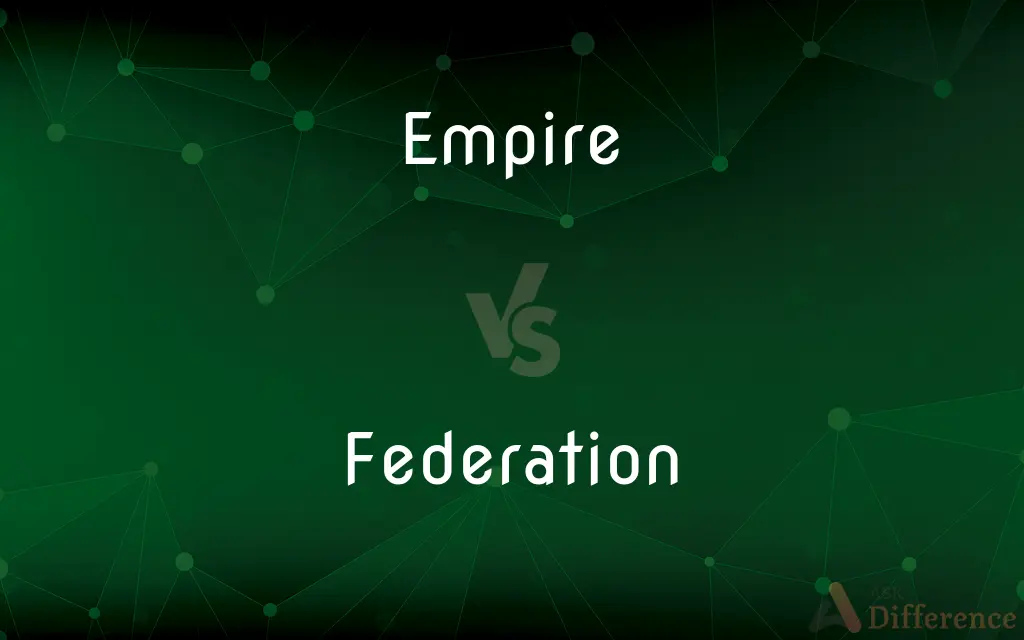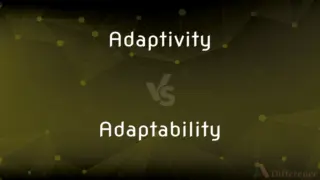Empire vs. Federation — What's the Difference?
Edited by Tayyaba Rehman — By Maham Liaqat — Updated on April 2, 2024
Empire typically denotes a vast sovereign state under a single monarch, while a federation is a political entity characterized by a union of partially self-governing states under a central government.

Difference Between Empire and Federation
Table of Contents
ADVERTISEMENT
Key Differences
An empire is a large political formation that usually extends over several territories and nations, often ruled by an emperor or a monarch. These territories might have been acquired through conquest or inheritance, and the central authority typically has supreme power. On the other hand, a federation is a form of government where several states, regions, or territories agree to unite under a central federal government while retaining certain powers of self-governance.
Empires historically have been associated with a centralized form of governance where the decision-making process is heavily top-down, with the emperor wielding ultimate authority. In contrast, federations operate on a principle of shared sovereignty, where the federal or central government handles certain responsibilities like defense and foreign policy, while states enjoy autonomy over local matters.
The concept of an empire often implies a diverse and multi-ethnic composition, with various cultures, languages, and regions under a single rule. This diversity sometimes leads to a rich cultural exchange but also to conflicts and resistance. Federations, however, are typically formed by entities that share common goals, values, or interests, which can lead to a more stable and cooperative political structure.
Empires can span multiple continents and have a significant impact on global history through their expansion, colonization, and the spread of culture, religion, and technology. Federations, while they can also be influential on a global scale, often focus on creating a balanced and equitable system of governance among their member states, promoting unity and shared development.
Empires, due to their centralized power and often autocratic rule, can face challenges related to governance, rebellion, and the maintenance of control over vast territories. Federations address these challenges by distributing power, which can lead to more effective governance and a higher degree of local satisfaction but also to disputes between the federal and state governments over jurisdiction and authority.
ADVERTISEMENT
Comparison Chart
Governance
Centralized under a monarch or emperor
Shared sovereignty between central and local governments
Formation
Often through conquest or inheritance
Agreement among sovereign states or regions
Power Distribution
Highly centralized
Decentralized, with significant autonomy for member states
Cultural Diversity
Highly diverse, encompassing multiple ethnicities
Typically diverse, but with a focus on shared values
Stability Challenges
Rebellion, overextension, governance issues
Jurisdictional disputes, varying local interests
Compare with Definitions
Empire
A sovereign state ruled by an emperor or monarch.
The Roman Empire was known for its vast territorial holdings across Europe and Asia.
Federation
A political entity characterized by a union of partially self-governing states or regions under a central federal government.
The Russian Federation comprises numerous federal subjects, including republics and oblasts.
Empire
A group of nations or peoples ruled over by an emperor, empress, or other powerful sovereign or government.
The Mongol Empire at its height was the largest contiguous land empire in history.
Federation
A union of organizations formed for mutual benefit.
The federation of local clubs provided a stronger voice in national affairs.
Empire
An extensive operation or sphere of activity controlled by one person or group.
He built a business empire in the fashion industry.
Federation
A form of government in which powers are divided between a central authority and constituent political units.
In the Federation of Australia, powers are distributed between the federal government and the states.
Empire
A major political unit having a territory of great extent or a number of territories or peoples under a single sovereign authority.
The Byzantine Empire continued the traditions of the Roman world.
Federation
A system of government in which several states form a unity but remain independent in internal affairs.
Germany is a federation consisting of 16 federal states.
Empire
An empire is a sovereign state made up of several territories and peoples subject to a single ruling authority, often an emperor. A state can become an empire either by a narrow definition through having an emperor and being named as such, or by a broad definition as stated above as an aggregate territory under the rule of supreme authorities such as the Roman Empire.
Federation
An organization or group within which smaller divisions have some degree of internal autonomy.
The International Federation of Red Cross and Red Crescent Societies coordinates activities between national chapters.
Empire
An extensive group of states or countries ruled over by a single monarch, an oligarchy, or a sovereign state
The Roman Empire
Federation
A federation (also known as a federal state) is a political entity characterized by a union of partially self-governing provinces, states, or other regions under a central federal government (federalism). In a federation, the self-governing status of the component states, as well as the division of power between them and the central government, is typically constitutionally entrenched and may not be altered by a unilateral decision of either party, the states or the federal political body.
Empire
A large commercial organization owned or controlled by one person or group
Her business empire grew
Federation
The act of federating, especially a joining together of states into a league or federal union.
Empire
Denoting a style of furniture, decoration, or dress fashionable chiefly during the First Empire in France. The decorative style was neoclassical but marked by an interest in Egyptian and other ancient motifs.
Federation
A league or association formed by federating, especially a government or political body established through federal union.
Empire
Denoting produce from the Commonwealth.
Federation
Act of joining together into a single political entity.
Empire
Of, relating to, or characteristic of a neoclassic style, as in clothing or the decorative arts, prevalent in France during the early 1800s.
Federation
Array of nations or states that are unified under one central authority which is elected by its members.
Empire
A variety of apple having dark red skin and white flesh.
Federation
Any society or organisation formed from separate groups or bodies.
Empire
A political unit having an extensive territory or comprising a number of territories or nations and ruled by a single supreme authority.
Federation
A collection of network or telecommunication providers that offer interoperability.
Empire
The territory included in such a unit.
Federation
(Australia) Of an architectural style popular around the time of federation.
We live in a federation house.
Empire
An extensive enterprise under a unified authority:a publishing empire.
Federation
The act of uniting in a league; confederation.
Empire
Imperial or imperialistic sovereignty, domination, or control:the extension of empire to distant lands.
Federation
A league; a confederacy; a federal or confederated government.
Empire
A political unit, typically having an extensive territory or comprising a number of territories or nations (especially one comprising one or more kingdoms) and ruled by a single supreme authority.
The Russian empire
Federation
An organization formed by merging several groups or parties
Empire
A political unit ruled by an emperor or empress.
The Empire of Vietnam was a short-lived client state of Japan governing Vietnam between March 11 and August 23, 1945.
Federation
A union of political organizations
Empire
The group of states or other territories that owe allegiance to an imperial power (foreign to them), when distinguished from the native territory of that power; imperial possessions.
Federation
The act of constituting a political unity out of a number of separate states or colonies or provinces so that each member retains the management of its internal affairs
Empire
An expansive and powerful enterprise under the control of one person or group.
The McDonald's fast food empire
Empire
(Absolute) control, dominion, sway.
Empire
Alternative case form of Empire.
Empire
Supreme power; sovereignty; sway; dominion.
Over hell extendHis empire, and with iron scepter rule.
Empire
The dominion of an emperor; the territory or countries under the jurisdiction and dominion of an emperor (rarely of a king), usually of greater extent than a kingdom, always comprising a variety in the nationality of, or the forms of administration in, constituent and subordinate portions; as, the Austrian empire.
Empire carries with it the idea of a vast and complicated government.
Empire
Any dominion; supreme control; governing influence; rule; sway; as, the empire of mind or of reason.
Another force which, in the Middle Ages, shared with chivalry the empire over the minds of men.
Empire
The domain ruled by an emperor or empress
Empire
A group of countries under a single authority;
The British empire
Empire
A monarchy with an emperor as head of state
Empire
A group of diverse companies under common ownership and run as a single organization
Empire
An eating apple that somewhat resembles a McIntosh; used as both an eating and a cooking apple
Common Curiosities
What are the advantages of a federation over an empire?
Federations can offer more local autonomy, potentially leading to more effective governance and satisfaction among diverse populations.
What is the main difference between an empire and a federation?
The main difference lies in governance; empires are ruled by a single sovereign with centralized power, while federations are unions of states with shared sovereignty.
Can an empire also be a federation?
Historically, some empires have adopted federative structures for governing vast territories, but the terms usually denote distinct forms of governance.
How does power distribution work in an empire compared to a federation?
In empires, power is centralized, whereas federations distribute power between the central government and its member states.
Can a federation turn into an empire?
A federation could theoretically centralize power and expand territorially, adopting characteristics of an empire, but this would involve significant changes in governance and identity.
Are federations more stable than empires?
Federations can be more stable due to distributed governance and local autonomy, but they also face challenges like jurisdictional disputes.
Which is older, the concept of an empire or a federation?
The concept of an empire is older, with federations emerging as a more modern approach to governance that accommodates diversity and local autonomy.
Is a federation the same as a confederation?
No, in a federation, the central government has direct authority over all individuals, while a confederation is a union of sovereign states with a weak central authority.
Can federations be formed for reasons other than governance?
Yes, federations can also refer to unions of organizations or groups formed for mutual benefit or to coordinate activities.
How do empires and federations handle cultural diversity?
Empires may encompass a wide range of cultures under a single rule, often leading to a rich cultural mosaic, while federations typically focus on unity and shared values among diverse member states.
Do empires still exist today?
Traditional empires have largely disappeared, but some countries maintain the title for historical or symbolic reasons.
What leads to the fall of empires?
Factors such as overextension, military defeat, economic troubles, and internal dissent can contribute to the fall of empires.
How do empires expand their territories?
Empires typically expand through military conquest, colonization, or diplomatic agreements.
What is a federal state?
A federal state is a constituent unit of a federation, having its own government for local matters, while sharing sovereignty with the central government.
Share Your Discovery

Previous Comparison
Adaptivity vs. Adaptability
Next Comparison
Smart vs. NerdAuthor Spotlight
Written by
Maham LiaqatEdited by
Tayyaba RehmanTayyaba Rehman is a distinguished writer, currently serving as a primary contributor to askdifference.com. As a researcher in semantics and etymology, Tayyaba's passion for the complexity of languages and their distinctions has found a perfect home on the platform. Tayyaba delves into the intricacies of language, distinguishing between commonly confused words and phrases, thereby providing clarity for readers worldwide.
















































